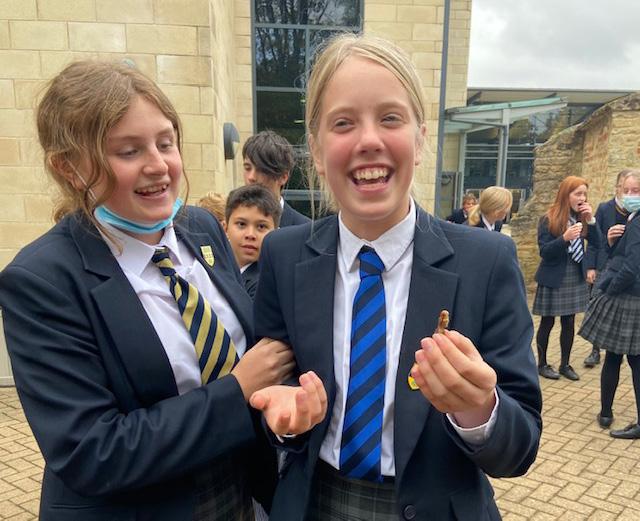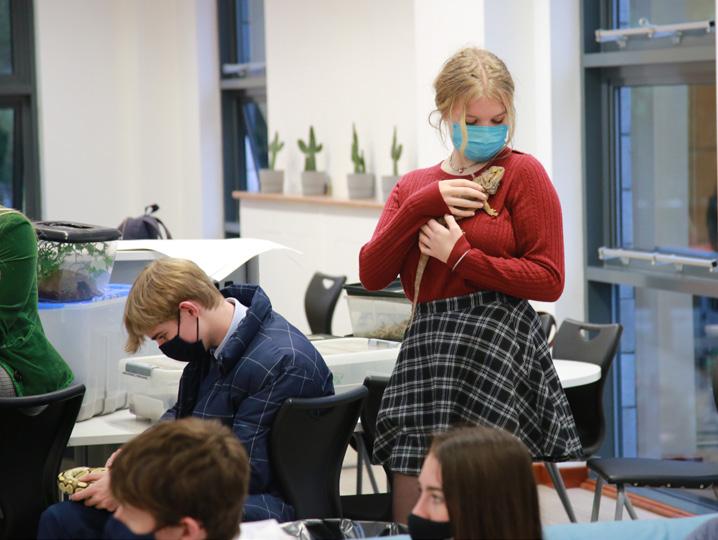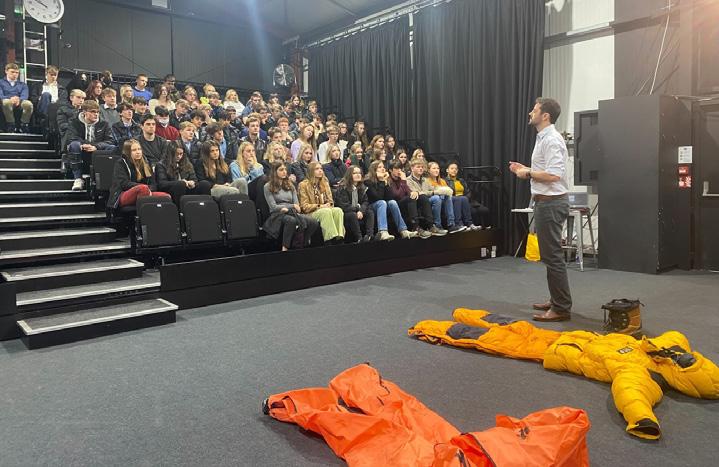
6 minute read
Crossing Borders Week Pages
Crossing Borders has been the subject of a recent week-long focus at Cokethorpe where, through a series of opportunities and activities, pupils and staff were encouraged to consider what it means to step out of our comfort zone and into the unknown.
When we talk of crossing borders, we usually mean that we are moving from one country to another … but not this week. This week has been all about challenge, about doing something new, about picking up a snake or eating ants or crickets. It has been about abseiling off the Mansion House or sleeping wild under a tarp, but it has also been about learning to make an origami crane or learning how to play Korfball. Some pupils have learned to suture, some have tried busking, but many have immersed themselves in a new experience in order to consider how we can better be comfortable with the unfamiliar.
Talks have included ‘The Domino Effect’ considering how small actions can lead to great change and ‘Black and British – a forgotten history’. Poetry from refugee writers has been posted around the campus and discussed in morning briefing. Pupils in French lessons considered an untitled poem by Alain Mabanckou that compared migration to the experience of a bird in flight. We want our pupils to become global citizens who can feel empathy for the plight of others and feel empowered to bring about change, even through small actions so that they can face the uncertain world of the future. This week has offered opportunities, not only for new experiences, but also ways of considering the part we can play.

Survival Night
As the sun was setting on a calm October afternoon, a handful of Third Form pupils decided not to take the regular commute home but to stay in School. These pupils had put their names forward to really test themselves in Crossing Borders week on the much anticipated ‘Survival Night’. After a quick briefing, the brave volunteers made their way into the School’s woods to complete their first task: building an improvised shelter to be their home for the night.

The second task involved keeping the group warm and fed for the evening. Pupils scoured the woodland collecting firewood and established a campfire using the resources available. The next element involved preparing the ingredients for their one pot meal for the evening, a vegetable chilli. The rigours of the day evidently caught up with the pupils as they all started to make their way into their shelters and sleeping bags for the remainder of the night. As the sun started to poke through to slowly warm the woods, the fire was relit for the final task: making bacon and egg rolls. The pupils emerged from the smoky woodland tired but triumphant. They all demonstrated great resilience, teamwork and resourcefulness in the face of adverse conditions.
Anna McNuff

Cokethorpe pupils were ushered into the world of international adventurer Anna McNuff. Named by Condé Nast Traveller as one of the 50 most influential travellers of our time, and by The Guardian as one of the top modern female adventurers, Anna has undertaken some truly awe-inspiring solo journeys and adventures: cycling and running unsupported across the Andes, the whole of the USA, New Zealand and the UK.
Anna foregrounded the idea that ‘the magic happens when we step outside our comfort zone.’ She regaled our pupils with tales of derring-do from every corner of the globe, stressing that each adventure begins with the simple desire to see something new and challenge oneself.
As part of their studies of the Norman Conquest this year and the theme of Crossing Borders, First Form visited Chepstow Castle and Tintern Abbey on Tuesday 19 October.
They spent the day looking at how castles gradually evolved to cope with ever more destructive weaponry, and the grandiose ambitions of their owners. For more than six centuries, Chepstow was home to some of the wealthiest and most powerful men of the Medieval and Tudor ages. From Chepstow, they travelled the short distance to Tintern Abbey. Tintern Abbey is a national icon on the banks of the River Wye. It was founded in 1131 by Cistercian monks. But then, thanks to the patronage of wealthy Marcher lords, in 1269 they began to build a new abbey church and did not stop until they had created one of the masterpieces of British Gothic architecture.
Pupils enjoyed the day, despite the ‘Medieval’ weather conditions and gained a real insight into how the Norman Conquest shaped the landscape of England and Wales from 1006 onwards. A note of thanks from the Lower Sixth BTEC Group for all the support with the #100 coats campaign.
With your support, they collected over 100 coats for adults and children. The adult coats have been dropped off to Aston and James, who will then distribute them to the homeless in Oxfordshire, and the children’s coats will be sent in a container over to Calais with the charity ‘Care4Calais’.
The Lower Sixth BTEC students also ran a cake sale and raised £144 which will go to the charity ‘Crisis’.
At the start of the term, the Prep School pupils were greeted one morning with a curious ‘Drink Me’ potion. Before a tentative taste, they imagined what might happen if they drank it.

Curiosity Activities
Fittingly, at the end of the first half of the Michaelmas Term, the pupils were presented with deceptive dishes to trial their tastebuds. Fickle foods such as ‘Eat Me’ grubs disguised the lemon drizzle cake and a ‘mouse mousse’ did tempt some of our Curious Clownfish. Unusual culinary techniques were also the theme of the Adventure Mornings run by the Head of Outdoor Learning, Mr Slader. He showed the pupils in Years 3 to 6 how to make a chocolate orange cake on a campfire. Oranges were hollowed out and filled with a chocolate brownie mix. The delicacy was wrapped in aluminium foil and baked on the fire, lit safely and skilfully by the pupils with their own flints. On Tuesday 23 November, all pupils in the Fifth Form were given the opportunity to sample the Sixth Form experience. The pupils attended four full-length Sixth Form taster lessons (which they had chosen in advance); for many this was a chance to try subjects that they have yet to study (for example, Psychology and Philosophy).
In addition, the pupils enjoyed various enrichment elements: a wonderful lecture given by Alex Hibbert, Polar Explorer, about an unexpected winter in Greenland; a quick-fire General Knowledge quiz in the Sixth Form Centre; a ‘thinking about your future’ workshop (led by Mr Uglow, Mrs Cooper and Mr Tolputt); and a carousel of skills workshops, including ‘Cookery’ with Mr Stone, Head Chef, ‘PublicSpeaking’ with Mr Walwyn, ‘Interview Skills’ with Mrs Black, and ‘Logic’ with Mr Waldron. An enjoyable, challenging and illuminating day was had by all.







